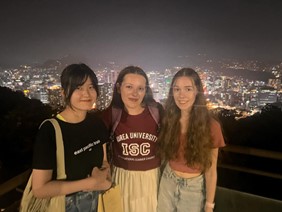Our global ambassador Carys details her top advice when considering a Summer opportunity and everything to consider

Study, research or volunteer?
Go Global offer a wide range of summer abroad opportunities, from academic summer schools to research placements and voluntary work. First, think about the type of experience you would like to have- for me, I was looking to broaden my psychological knowledge by learning new things in a new cultural, academic environment. On the other hand, voluntary work is a great way to completely immerse yourself in a new culture; gaining hands-on experience working with the local community and developing non-academic skills.
What are you hoping to achieve? Academic goals? Personal development?
A summer abroad might be a great way to develop your academic skills- think about how this opportunity might relate back to your current degree and subject- it might be a great way to learn about unique topics from a new perspective, enhancing your academic knowledge. Going abroad is also a great way to work towards more personal goals, for example developing independence, self-confidence and essential life skills such as budgeting and problem-solving.
Location
The location was a huge factor for me when deciding where to go. Some things to think about might be:
- Language- is English widely spoken in this country? What other languages are you experienced with? What languages are the courses mainly taught in?
- Weather- are you more drawn towards a hot or cold climate? I knew I wanted somewhere hot and sunny to get a break from the miserable English grey skies, so South Korea was perfect- it even had the occasional monsoon to cool us down!
- Safety- is it safe to explore the country alone? Check the UK government’s FDCO website for the latest updates about safety concerns in specific countries and cities. Whilst researching opportunities, it became clear to me that South Korea had a very low crime rate, with Seoul being named as one of the safest cities for solo travellers in the world.
- Culture shocks- do your research into the traditions and common cultural practices so you know whether to expect any major differences compared to life in the UK, and how to navigate these.
- Public transport and wider experiences- are you in a large city, with great public transport? Will you have things to do, places to explore? Will you remain mostly in the university/organisation’s facilities? At Korea University, I was in close proximity to the subway stations that could take you anywhere in Seoul in an instant! It made travelling to museums, cafes and shopping centres quick, cheap and easy.
- Food and dietary preferences- do you have any allergies or dietary requirements? Research the local cuisine and check that there is something for you to eat! Is your food provided for you? Some universities have meal plans, making budgeting and grocery shopping less of a burden, but it is also important to remember that not all foods are widely available in other countries- for example in South Korea, vegetarian and vegan food was hard to find, and more expensive.
- Travel requirements- will you need a student VISA or other travel permits? What vaccinations will you need? Make sure to check deadlines!
- Accommodation- will you be able to live on campus? What rooms do they offer- will you be comfortable sharing facilities if needed? If not, what are the private/off-campus accommodations available? In South Korea, I was able to stay in on-campus halls of residence, with different options for single or shared rooms, meaning I did not have to worry about finding my own place to stay.
- Distance- transitioning to a new country can be scary and challenging at times- would it be more reassuring to go to a country closer to home? Or are you up for a new challenge, and consider going further away? Are you an experienced traveller, or is this your first time ever going abroad?
Research the courses
When looking at different academic summer schools, I looked at the individual courses and programmes on offer. It is important to consider the duration- some courses are 3 weeks, whereas KU was 6 weeks! This matters not only for funding eligibility, but also your own personal capabilities- will you feel more at ease on a shorter placement? Another thing to consider is the flexibility of the courses- do you have any free time? How many classes are you required to take? Are they assessed, and if so, how? Are there any cultural learning opportunities available? In Korea, I was able to choose to take a beginner’s language course and participate in field trips to museums, baseball matches and theatre performances, enabling me to fully experience the Korean culture.
Finances
A main factor for me were the costs- research into the cost of living in your chosen country and city, and check it fits with your budget. Some important things to take into account are groceries, transport, accommodation and tuition fees, and cultural experiences and trips out. Also, check whether you are eligible for any scholarships or funding, such as through the Turing Scheme.
Extra support
Finally, it is important to look after your physical and mental health. When choosing your opportunity, make sure the host institution can accommodate any additional support you might require, such as disability access and exam arrangements. Will there be support staff on site if you have a problem? Are you able to contact home, or your support network if you need to?